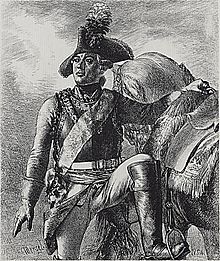
Back Friedrich Wilhelm von Seydlitz AN فريدريش فيلهلم فون سايدليتز Arabic فريدريش فيلهلم فون سايدليتز ARZ Фрыдрых Вільгельм Зейдліц Byelorussian Фридрих Вилхелм фон Зайдлиц Bulgarian Friedrich Wilhelm von Seydlitz Breton Frederic Guillerm von Seydlitz Catalan Friedrich Wilhelm von Seydlitz Czech Friedrich Wilhelm von Seydlitz German Federico Guillermo von Seydlitz Spanish
Friedrich Wilhelm von Seydlitz | |
|---|---|
 Portrait by Adolph Menzel, 1854 | |
| Born | 3 February 1721 Kalkar, Duchy of Clèves, Holy Roman Empire |
| Died | 8 November 1773 (aged 52) Ohlau, Silesia, Kingdom of Prussia, Holy Roman Empire |
| Allegiance | Kingdom of Prussia |
| Service | Prussian Army |
| Years of service | 1739–1773 |
| Rank | |
| Battles / wars | |
| Awards | |
Friedrich Wilhelm Freiherr von Seydlitz[Note 1] (3 February 1721 – 8 November 1773[1]) was a Prussian officer, lieutenant general, and among the greatest of the Prussian cavalry generals. He commanded one of the first Hussar squadrons of Frederick the Great's army and is credited with the development of the Prussian cavalry to its efficient level of performance in the Seven Years' War. His cavalryman father retired and then died while Seydlitz was still young. Subsequently, he was mentored by Margrave Frederick William of Brandenburg-Schwedt. Seydlitz's superb horsemanship and his recklessness combined to make him a stand-out subaltern, and he emerged as a redoubtable Rittmeister (cavalry captain) in the War of Austrian Succession (1740–1748) during the First and Second Silesian wars.
Seydlitz became legendary throughout the Prussian Army both for his leadership and for his reckless courage. During the Seven Years' War, he came into his own as a cavalry general, known for his coup d'œil, his ability to assess at a glance the entire battlefield situation and to understand intuitively what needed to be done: he excelled at converting the King's directives into flexible tactics. At the Battle of Rossbach, his cavalry was instrumental in routing the French and Imperial armies. His cavalry subsequently played an important role in crushing the Habsburg and Imperial left flank at the Battle of Leuthen. Seydlitz was wounded in battle several times. After the Battle of Kunersdorf in August 1759, he semi-retired to recover from his wounds, charged with the protection of the city of Berlin. He was not healthy enough to campaign again until 1761.
Frederick rewarded him with Order of the Black Eagle on the field after the Battle of Rossbach; he had already received the Pour le Mérite for his action at the Battle of Kolin. Although estranged from Frederick for several years, the two were reconciled during Seydlitz's final illness. Seydlitz died in 1773, and Frederick's heirs included his name on the equestrian statue of Frederick the Great in Berlin, in a place of honor.
Cite error: There are <ref group=Note> tags on this page, but the references will not show without a {{reflist|group=Note}} template (see the help page).
- ^ Poten, Bernhard von (1892), "Seydlitz-Kurtzbach, Friedrich Wilhelm Freiherr von", Allgemeine Deutsche Biographie (in German), vol. 34, Leipzig: Duncker & Humblot, pp. 94–101